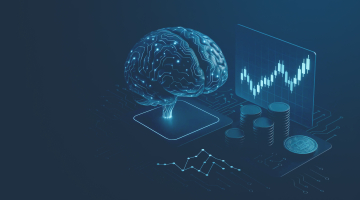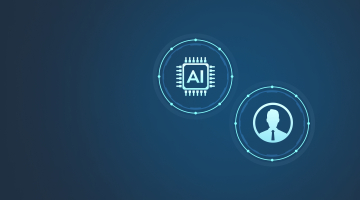

Generative AI in customer service: Challenges and future trends
The exceptional customer experiences of their clientele are the coveted dream of modern enterprises poised for big-time success. It hinges on the quality of products they sell, swift delivery, and smooth customer journey across all touchpoints. One of the cornerstones of success in this field is efficient customer service, which often becomes a tipping factor in a consumer’s decision to continue or end cooperation with the brand.
Given the ongoing globalization of the economy, an exponential surge of the consumer base, and cut-throat competition existing in the contemporary customer service landscape, organizations can’t stay ahead of the curve and outsell their rivals just by expanding their contact centers, increasing the pool of customer service agents, or improving efficiency of their efforts. In our profoundly digitalized age, you can radically transform customer service only by employing disruptive tools to assist or even replace human agents in handling customer queries and dealing with other customer service operations.
This article highlights the role of generative AI in key customer service functions, showcases the advantages of generative AI customer service compared to traditional practices in this sector, lists customer service applications of this technology, and offers a roadmap for implementing generative AI for customer service.
Experiencing a lack of technical expertise and skills?
Connect with a professional team to address your project challenges.
Making the case for customer service generative AI
What two words can be used to characterize the current phase of the digital revolution? Definitely, these are artificial intelligence. Cutting-edge AI technologies covered by this term (natural language processing, computer vision, neural networks, deep learning and machine learning systems, large language models, etc.) are quickly turning from expensive toys into indispensable tools that push the technological envelope across multiple business domains.
Generative AI is one of the most wanted high-tech advancements of the early third millennium. Initially geared for content creation, it has evolved into a powerful tool that goes far beyond generating commercial enterprise blog posts or formulating brand guidelines. As real-world examples show, in 2024, 65% of organizations (which is a meteoritic spike compared to 33% the year before) deploy generative AI-powered solutions in various workflows, among which customer service ranks within the top five.
gen AI usage by function
In this sphere, AI algorithms that fuel chatbots leverage the power of NLP to analyze data containing various customer inquiries (conventionally some simple and frequent ones) and produce automated responses that take into account context and even customers’ emotions. Moreover, generative AI systems learn from customer interactions in the process of their functioning, improving the accuracy and relevance of the interactive voice responses they produce. If some customer complaints turn out too complex for GenAI mechanisms to handle, they will route them to live agents working in customer support teams who are qualified to deal with more intricate customer questions.
Let’s see what perks generative AI offers to companies that integrate it into their customer service pipeline.
Benefits of generative AI in customer service
Organizations employing GenAI tools report the following improvements in their customer service operations.
Benefits of gen AI in customer service
Enhanced efficiency and business productivity
As Statista shows, this boon attracts businesses the most.
Generative AI solutions can handle multiple customer inquiries simultaneously, which minimizes waiting time, accelerates issue resolution, optimizes resource utilization by freeing human personnel to pursue more complex, strategic, or creative tasks, and consequently boosts productivity by as much as 14%.
24/7 availability
AI customer service tools work round the clock without holidays and days off. They don’t call in sick or go on a vacation. They aren’t limited by time zones or business hours. Thus, consumers know that they can apply for help at any minute and get their problem solved immediately.
Personalization of interactions
The latest survey by Salesforce reveals that 73% of customers feel unique and valued when contacting a company, which is a stunning leap from 39% two years ago. Evidently, generative AI tools increasingly leveraged by businesses have something to do with it. They analyze customer data to obtain a holistic view of the client and tailor responses and recommendations to their individual needs and preferences.
Automation maturity
With a robust generative AI solution in place, organizations can automate the lion’s share of their customer service routines, delegating repetitive and low-profile tasks (like handling common queries or report generation) to machines and letting employees focus on more meaningful assignments.
Customer service consistency
While the human workforce can provide customer support of varied quality, GenAI remains consistent in its responses and operations thanks to pre-defined rules and guidelines for its functioning. As a result, clients receive uniform assistance across numerous touchpoints and channels, which maintains the high standard of service quality and ensures the holistic brand image throughout all interactions.
Data-driven decisions
An out-and-out analysis of customer data conducted by generative AI algorithms allows specialists to expose trends and patterns across vast data sets. Armed with such insights, they can adopt knowledgeable decisions concerning various aspects of customer support and personalization of services.
Multilingual support
Businesses operating globally have to recruit and train diverse teams fluent in several languages. Or rather had to, until the advent of generative AI. The disruptive technology allows companies to provide support in multiple languages, facilitating service localization and catering to a wider consumer audience.
Cost efficiency
Since numerous customer support processes are delegated to AI, the need for human personnel plummets, saving companies a pretty penny on salaries, training, workstation equipment, and other OPEX elements vital for cash-strapped startups and small businesses on short commons.
Increased customer loyalty
Consumers who receive an adequate level of support and an enjoyable customer experience are less likely to churn but are sure to stay with the company and even recommend it to their family, friends, and colleagues, becoming brand advocates and ambassadors.
Competitive advantage
Robust and consistent customer service in many languages, a high degree of pipeline automation, prompt issue resolution, data-driven decisions, unwavering loyalty of the clientele, and reduced operating expenditures translate into a sharp competitive edge obtained by businesses leveraging generative AI in their customer support workflows.
This all sounds impressive, but what about old-school customer service? Can’t it do the same things without the considerable investment that novel technologies require?
Traditional vs generative AI customer service: A head-to-head comparison
When consulting companies on implementing generative AI tools for their customer service, we at DICEUS point out the following upsides of state-of-the-art solutions.
Support mechanisms
While classical customer service teams rely solely on human agents (with all shortcomings and weaknesses attributed to human factors), generative AI-driven virtual assistants and chatbots complement people, adding their expertise to the human touch ensured by employees.
Data collection
Virtual agents and AI-fueled solutions excel at fast retrieval of huge datasets from multiple sources, whereas the human workforce does it manually, thus much slower and with a greater number of errors and other inadequacies.
Response time
It takes traditional teams much longer to respond to customer calls and find relevant information, which may cause people’s frustration. Generative AI guarantees improved customer experience by giving real-time responses and reducing waiting time.
Adaptability
Using customer feedback as a change facilitator, generative AI-driven customer service quickly adapts to emerging market trends and evolving consumer needs. Traditional customer service teams who don’t have immediate access to constantly fluctuating knowledge base and customer data are much slower in adjusting to shifts and transformations.
Scalability
In peak times, traditional support teams struggle with sudden increases in demand. GenAI-driven tools allow for easy upscaling, handling growth in its stride.
Customer insights
All that a conventional customer service team can employ to derive valuable insights concerning the clientele is historical data and knowledge articles haltingly processed by humans. A generative AI tech stack can amplify existing data with real-time information, empowering agents with a granular understanding of customer sentiment, behavior, and purchasing habits.
Proactivity
Generative AI solutions pave the way to changing customer service from reactive problem-solving symptomatic of the classical approach to proactive anticipation of client needs, identification of potential issues, and their prompt resolution before they escalate.
Now when you see that onboarding generative AI is a surefire recipe for guaranteeing full-scale customer satisfaction, it is interesting to learn about the technology’s possible applications in customer service.
Applications of generative AI for customer service scrutinized
DICEUS’s experience in building bespoke generative AI solutions tells us that organizations most often leverage them for such customer service use cases.
How gen AI is used in customer service
Chatbots and virtual assistants
This is what almost all consumers expect from enterprises they cooperate with. These NLP-based tools are available to consumers round the clock, responding to their queries, providing product information, processing orders, scheduling appointments, troubleshooting typical issues, and more.
Self-service
GenAI-fueled conversational interfaces empower people to find solutions to their problems without the help of support personnel. They provide access to knowledge bases and FAQ sections to let consumers obtain instant answers to their inquiries.
Knowledge base optimization
Given the volatility of trends and processes in the modern business world, information repositories require constant maintenance. Generative AI tools analyze them 24/7 to detect common issues, mend inadequacies, update records, and fine-tune response strategies to ensure users receive the most relevant and accurate information.
Sentiment analysis
Generative AI mechanisms can identify emotions people express during conversations, which helps enterprises identify potential issues in real-time and react to them on short notice, thus improving customer satisfaction dramatically.
Advanced call transcription
By providing clear and comprehensive customer interaction transcripts, GenAI solutions create a rich database that can be utilized for detecting typical problems, deriving valuable insights into client needs, and/or resolving potential disputes.
Streamlined call transfers and escalations
Very often, consumers contacting the support team have to repeat their concerns several times to each new agent their issue is delegated to, which naturally causes frustration and exasperation. Generative AI solutions enable every next agent to continue the conversation from where the previous one left off by sending them a concise summary of the interaction. It is a powerful time-saver and customer experience booster.
Real-time translation
This capability is priceless for international businesses and companies with worldwide customer base. When implemented in generative AI-driven chatbots, it eliminates language barriers and enhances the accessibility of services the organization provides.
Improved ticket resolution
GenAI mechanisms can classify customer inquiries, prioritize them according to urgency, and route them to departments or agents whose competence enables them to solve problems quickly. As a result, resolution time is kept to a minimum, and service efficiency soars.
Generating email responses
AI algorithms are honed to understand the message and context of each customer email or review the organization receives. Such capabilities allow generative AI tools to produce personalized responses tailored to efficiently address the client’s concerns or thank them for their contribution.
Issuing product recommendations
It is also about personalization. By analyzing previous interactions with the client and their usage data, AI makes conclusions as to the individual’s preferences, tastes, and pain points. Such insights enable it to identify relevant products as well as maximize the efficiency of cross-selling and upselling initiatives, thus driving sales and augmenting customer experience.
Predictive assistance
Nipping the problem in the bud before it becomes a serious nuisance is essential for forward-looking businesses. Generative AI software can do it perfectly by analyzing past behavior patterns and interactions, anticipating potential issues, and contacting customers proactively to forestall negative developments.
Training materials creation
AI tools accumulate a vast store of information concerning products they recommend, services they offer, and people they contact. It can be used to make a manual that human agents will rely on while getting trained to perform their responsibilities.
To derive maximum value from generative AI customer service in each use case, you should approach its integration wisely.
Implementing generative AI for customer service: A roadmap to follow
As a vetted expert in developing generative AI solutions for enterprises, DICEUS recommends employing an efficient implementation algorithm consisting of 7 steps.
How to implement gen AI
Step 1. Define your needs
Since any state-of-the-art tool is a big-ticket item, you should use it primarily for workflows where it will yield the greatest ROI and tackle the most challenging tasks. To pinpoint such areas, you should collect and analyze your current customer service data, interview your support team, evaluate existing workflows, and determine the KPIs (response time, first contact resolution rate, customer satisfaction score, etc.) you want to improve. Then, develop a comprehensive implementation strategy containing goals, timelines, milestones, review points, budget, and other details.
Step 2. Choose the right GenAI tool
Various tools are honed for different use cases. You should pick one that fits your goal to a tee, paying attention to its scalability potential, integration power, and customization options.
Step 3. Prepare training data
The accuracy and relevance of responses generated by AI mechanisms critically depend on the quality of input data used for model training. To assist customers in solving their problems, you should provide as large a dataset as possible derived from relevant sources (customer conversations transcripts, chat logs, emails, etc.), containing up-to-date, consistent, accurate, and thematically categorized information, compliant with data protection regulations. The outcomes will be much better if you integrate the generative AI tool with your current CRM system.
Step 4. Train the model
Now, the collected data is used to teach the model specific customer service scenarios. Usually, it happens during multiple training rounds when the more complex data from different interaction styles is progressively involved in preparing AI for various temperaments and communication types.
Step 5. Test and refine
Continuous testing is employed while the training is still underway by feeding new, unseen data into the model to assess response accuracy. But when the training is over, a thorough check-up is conducted via utilizing the created generative AI solution in controlled settings by a pilot group of support agents for a limited customer segment. During the procedure, you should watch performance metrics closely to see whether response time and accuracy meet expectations.
Step 6. Implement
The system is deployed and integrated with your existing digital infrastructure. After it is committed, you should encourage consumers to provide feedback in customer surveys to see how they enjoy the solution. Another source of information concerning the tool’s performance is conversation analytics, which can help you discover unreported but trending sentiment in a client’s speech. All this data is then used to tweak and refine your AI.
Step 7. Improve continuously
Fine-tuning the system is an ongoing process that lasts as long as the solution is in use. Feedback loops and regular optimizations help address technical issues or UX inadequacies and keep the system open to new developments in the industry.
Evidently, creating and implementing a first-rate customer service generative AI solution is a no-joke task that should be delegated to seasoned specialists in the sector. DICEUS’s qualified and certified professionals possess both the skills and experience to create a robust GenAI tool that will give a powerful boost to your customer service, increasing its efficiency and stepping up customer satisfaction. Contact us to reinvent your customer service with generative AI.
Estimate project costs
Please share more details of your project with our team.

Key takeaways
Generative AI is a cutting-edge technology that revolutionizes various workflows across multiple verticals. When used in the realm of customer support, it increasingly ousts traditional manual and inefficient practices that rely on laborious data processing, reactive approach, and slow service speed. GenAI tools don’t replace human personnel but complement their efforts and usher in numerous boons, such as 24/7 availability, multilingual interactions, in-depth process automation, boosted efficiency and productivity, cost saving, high degree of personalization, enhanced customer experience, and sharp competitive edge.
Given such weighty perks, generative AI-based chatbots, virtual assistants, and other solutions find ready application in various customer service activities, including self-service empowerment, knowledge base optimization, sentiment analysis, call transcription and transfers, real-time translation, email response generation, issuing tailored product recommendations, predictive assistance, training materials creation, you name it.
When implemented by high-profile experts in the AI field according to a well-established roadmap, generative AI software can revolutionize a company’s customer service pipeline and ensure long-term customer satisfaction of its clientele.
Frequently asked questions
What are the key benefits of using generative AI in customer service?
Companies that integrate generative AI tools in their customer service workflows enjoy greater efficiency, business productivity, and automation maturity, high-scale personalization, round-the-clock availability to clientele speaking in various languages, data-driven decisions, cost reduction, enhanced customer loyalty, and a sharp competitive edge.
What steps are involved in implementing generative AI in customer service operations?
First, you should understand your needs and determine what GenAI application will bring the greatest ROI. Then, you should choose the proper AI tool able to address your problem, pre-process training data, train the AI model, test and refine its performance in controlled settings, implement the created generative AI customer service solution, and exercise its continuous improvement and optimization to keep it relevant for the task it handles.
How can DICEUS help businesses integrate generative AI into their customer service systems?
Our qualified and certified AI engineers possess in-depth theoretical knowledge, advanced hands-on skills, and valuable experience in the domain to create a bespoke generative AI solution honed to tackle a specific customer service workflow and aligned perfectly with the company’s vertical, business needs, and target audience peculiarities.





